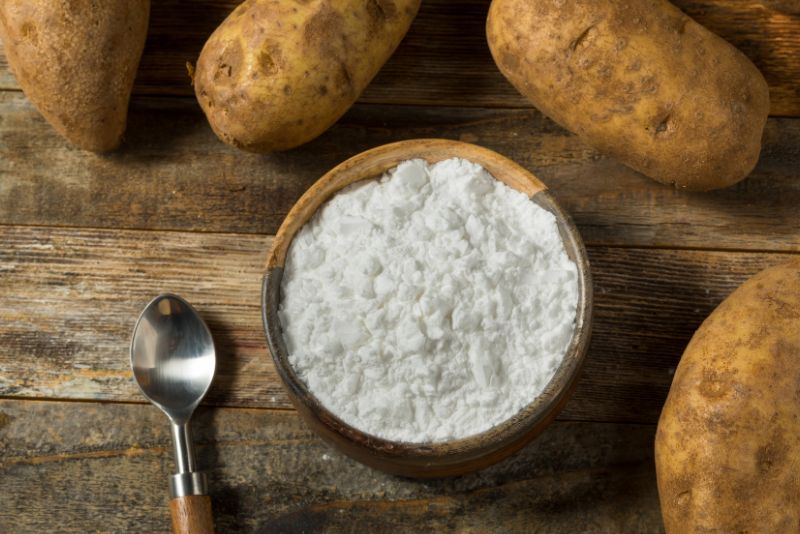Potato flour is a starchy, fine-textured powder made from cooked, dried potatoes. It is used as a thickening agent in sauces and gravies, or to add moisture and flavor to baked goods like bread, pies, muffins, and pancakes. However, potato flour has a few drawbacks — it is high in carbohydrates and calories, and it can be difficult to find in stores.
Fortunately, several other ingredients can be used as a substitute for potato flour. Keep in mind that the flavor and texture of your dish may be affected when using a substitute.
In this blog post, I’ll share a few of the best substitutes for potato flour.
Table of Contents
14 Substitute for Potato Flour
The best substitutes for potato flour are mashed potato and cornstarch. You can also use arrowroot powder, rice flour, and tapioca flour as potato flour substitute in most recipes.
Read on for the best tapioca flour substitutes and how you can use them in your recipes.
1. Mashed Potato
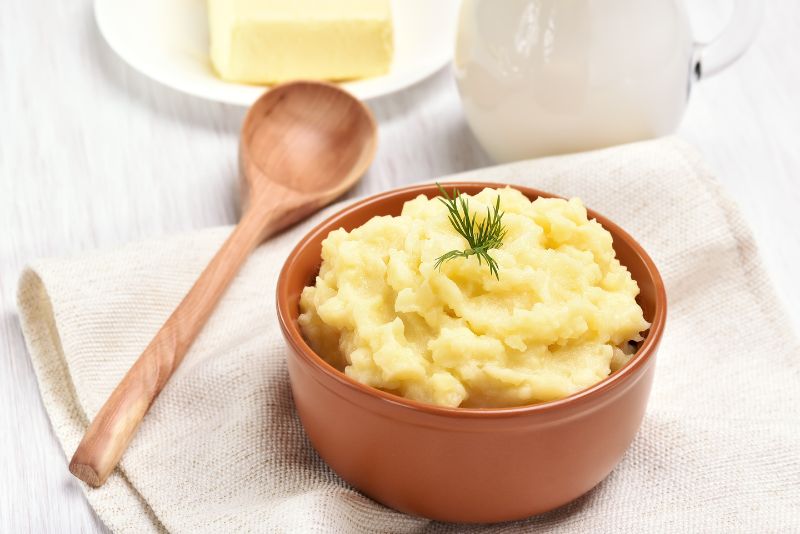
Mash potatoes are the most practical option if you’re seeking a potato flour substitute for baking.
To provide more moisture and softness to bread recipes, potato flour is typically called for. However, the majority of pantries do not often have much potato flour. Mashable potatoes are the greatest option if you want a quick substitute that has the same flavor and texture.
Finding the ideal water-to-potato ratio is one drawback of mashed potatoes. Your bread will become sticky if you add too much water, and it may turn quite hard if you add too little.
The amount of moisture makes mashed potatoes and potato flour significantly different. Since potato flour is a dry substance, it has no moisture. On the other hand, water is present in mashed potatoes.
2. Cornstarch
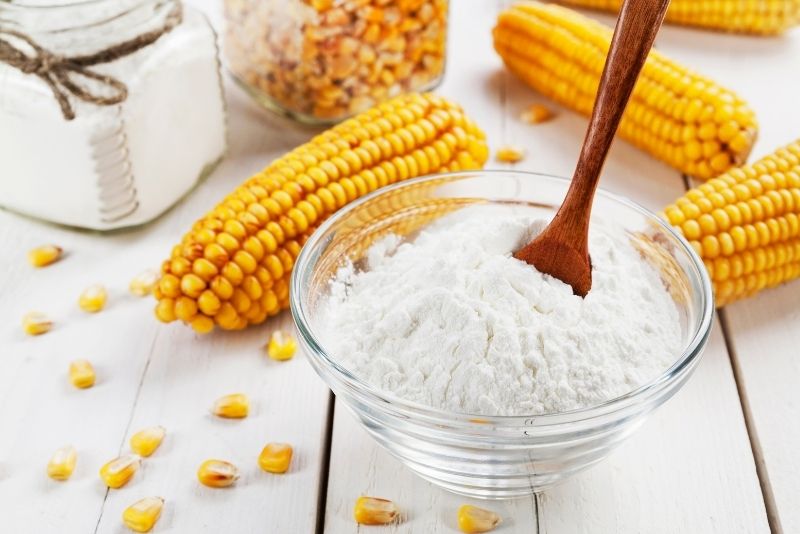
Cornstarch is a versatile substitute for potato flour in baking recipes. It offers the same properties and results as potato flour, making it ideal for gluten-free baking. On some foods, cornstarch comes the closest to replicating the texture of rice flour.
Although yours doesn’t have the scrumptious, earthy aromas of potato flour, it nevertheless functions very similarly. Corn endosperm is used to make cornstarch. In recent years, using this gluten-free alternative for baking has grown in popularity.
Potato flour contains starch, which aids in keeping any dish moist. Because of this, adding potato flour to bread causes it to feel softer. The moisture level is retained for a longer amount of time by cornstarch, which performs the same function. So, after a few days, your bread won’t become stale.
Apart from flavor, there isn’t much of a difference between these two substances. Since cornstarch lacks any flavor, it has little effect on the food.
Additionally, cornstarch can be used in other recipes such as pancakes and waffles. You can find cornstarch at most supermarkets or health food stores. Always read the ingredients before using them to make sure there are no allergies involved.
3. Arrowroot Powder
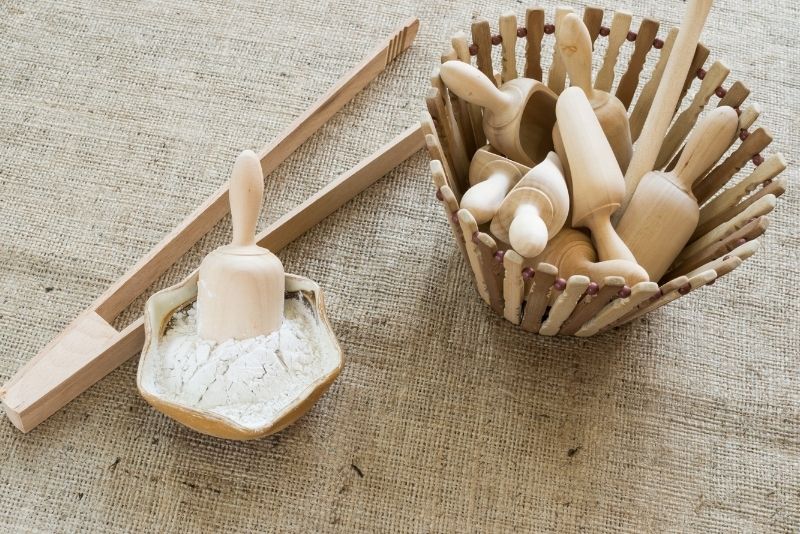
Arrowroot powder is a flour substitute that can be used in baking recipes. It has a similar texture and flavor to potato flour so it’s perfect for substituting in recipes. Additionally, arrowroot powder can be used as a thickener, emulsifier, and binder.
This makes it versatile and ideal for many different food preparations. Another great thing about arrowroot powder is that its flavor is neutral which means it can be used in savory or sweet dishes without having an impact on the taste of the food.
In fact, arrowroot powder even works well in smoothies! So if you’re looking for an all-purpose flour substitute, arrowroot powder should definitely be at the top of your list!
4. Tapioca Flour
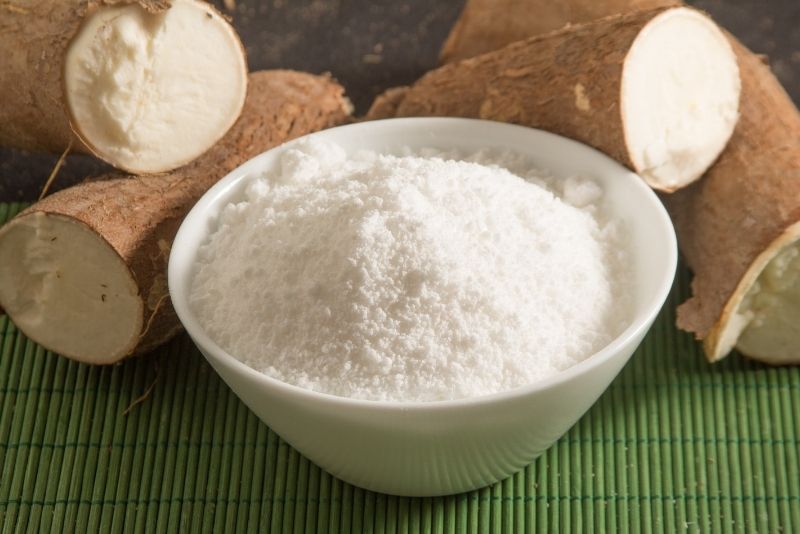
Tapioca flour is a gluten-free, vegan flour that has many versatile uses. It can be used in place of wheat flour, cornstarch, or rice starch in baking recipes and offers similar texture and moisture absorption properties to these flours.
Some brands of tapioca flour are better than others – make sure to read the ingredients list before using it in your recipe as not all brands are created equal.
Additionally, tapioca flour can also be used interchangeably with potato flour when baking gluten-free items or food items that do not require a thick consistency.
5. Quinoa Flour
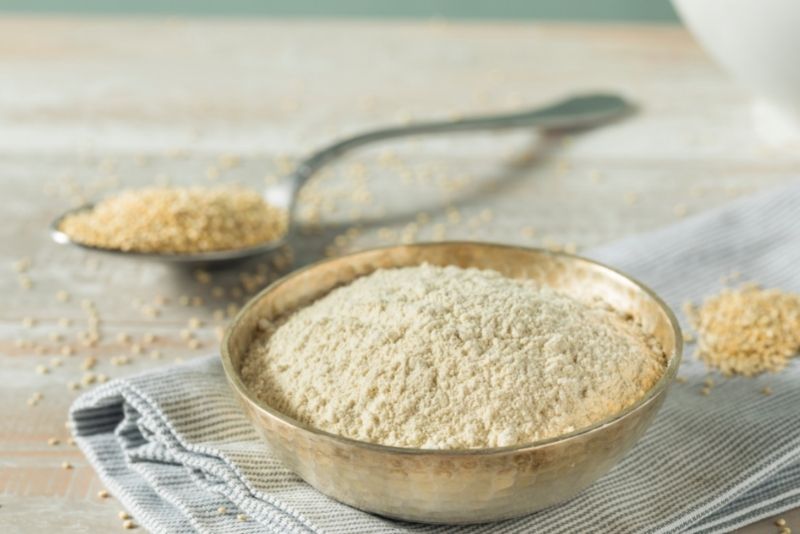
Quinoa flour is a gluten-free, high-quality substitute for potato flour in baking. It has the same texture and moisture-lift properties as potatoes, making it perfect for recipes that call for potato flour.
Quinoa flour is also gluten-free, which makes it an ideal substitute for people with dietary restrictions such as celiac disease or diabetes. Keep in mind that quinoa flour may not be suitable for all types of baking – consult your recipe before starting!
In addition to baking applications, quinoa flour can be used interchangeably with all-purpose flour in bread and muffins. For those on a gluten-free diet or wanting to reduce their starch intake, quinoa flour is an excellent option.
6. Rice Flour
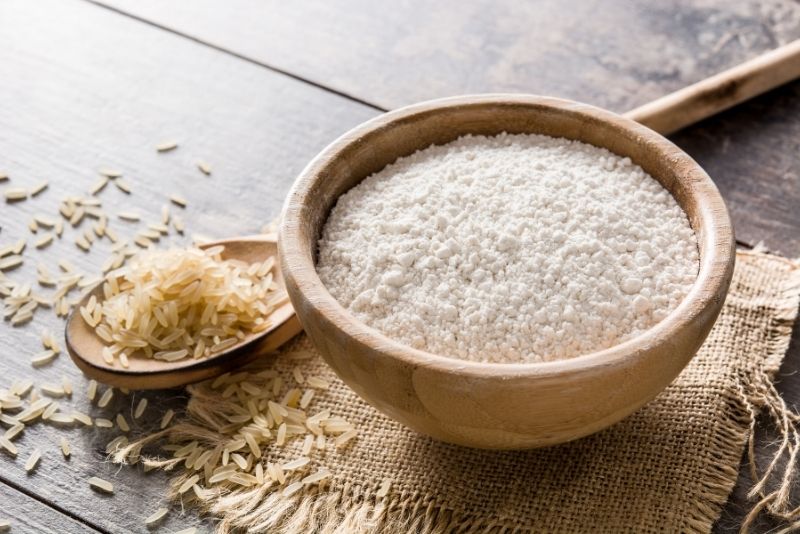
Rice flour is a versatile flour that can be used to replace potato flour in baking recipes. It has a slightly different texture so it needs to be handled with care, but that doesn’t mean you have to give up on using rice flour in your baking repertoire!
You can also use it interchangeably with wheat or almond flour, depending on the recipe. Some common applications of rice flour include bread dough and cake batter- both of which benefit from its moisture-free properties.
Additionally, rice starch contributes to gluten-binding properties and makes baked goods less dense and more tender than products made from wheat or almond flour. Make sure to read the recipe thoroughly before starting so you don’t end up with an unenjoyable product!
Rice starch also helps food retain moisture, making it perfect for sauces, gravies etcetera. As always – experiment liberally and see what works best for your particular recipe!
7. All-Purpose Flour
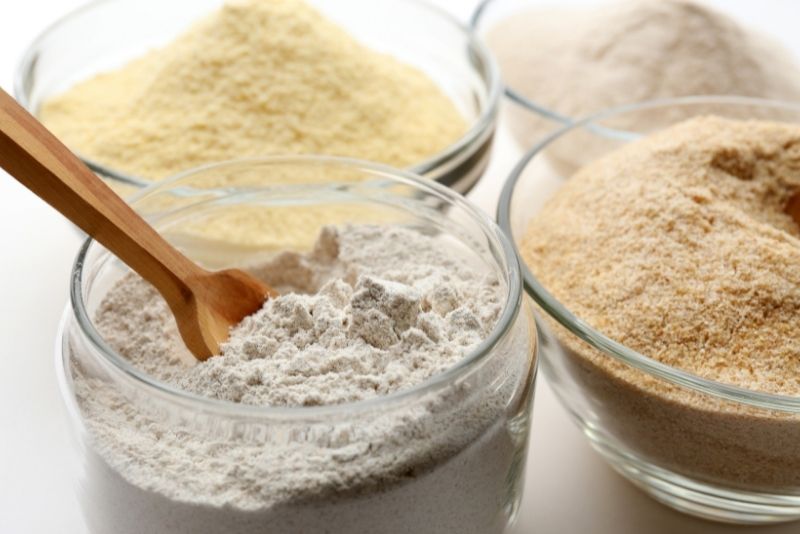
All-purpose flour is a versatile option that can be used for both sweet and savory dishes. There are many different types of flour you can substitute potato flour with, such as almond, soy, oat, etc., so it’s perfect for people who want to avoid gluten contamination.
Make sure to measure the flours correctly before using them in recipes – they can vary significantly in moisture content. This affects how thick or thin your sauces will turn out and also their flavor.
Store all-purpose flour in an airtight container to ensure its flavor and nutrients stay intact. All-purpose flour can also be used as a thickener in sauces and gravies alike!
8. Wheat Flour
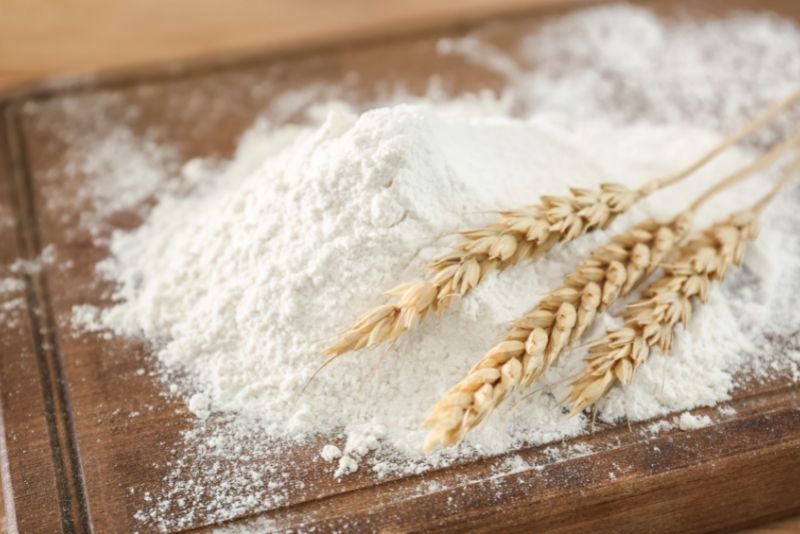
Wheat flour is a versatile baking ingredient that can be used in place of potato flour in many recipes. It is a good source of carbohydrates and gluten which are essential for bread making.
Along with its substitute properties, wheat flour can also be used to make pastries, biscuits, scones etcetera. Make sure to use the correct proportion when substituting – otherwise, your recipe will turn out wrong!
Wheat flour isn’t as thickening as some other flours so it shouldn’t be used in place of cornstarch or arrowroot starch very often.
9. Potato Flakes
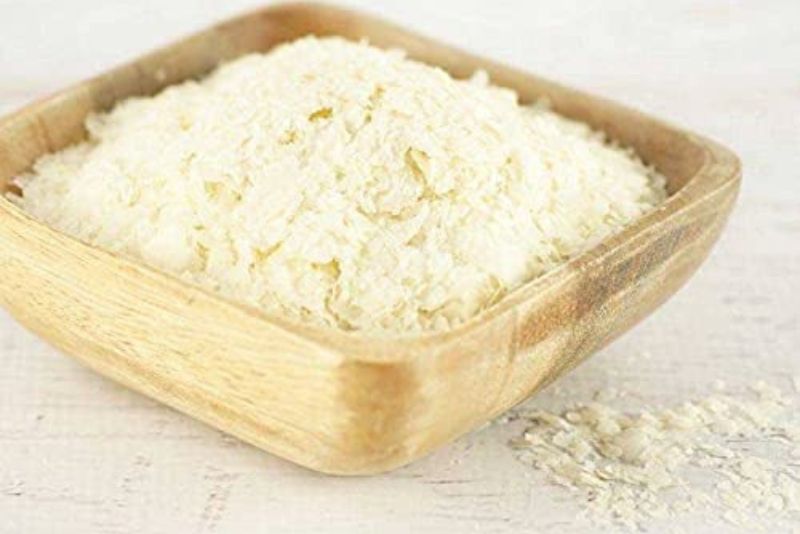
If you are gluten-free, looking for a substitute for flour, or just want an excellent snack option, potato flakes might be the right flour substitute for you.
These flakes make an excellent cake-like texture and can be used in place of all-purpose flour, whole wheat flour, etc in baking recipes.
They also work just as well as regular flour – so there’s no need to feel guilty about eating them! If potato flakes aren’t your thing, check out our other gluten-free flours such as almond powder or rice starch powder.
10. Coconut Flour
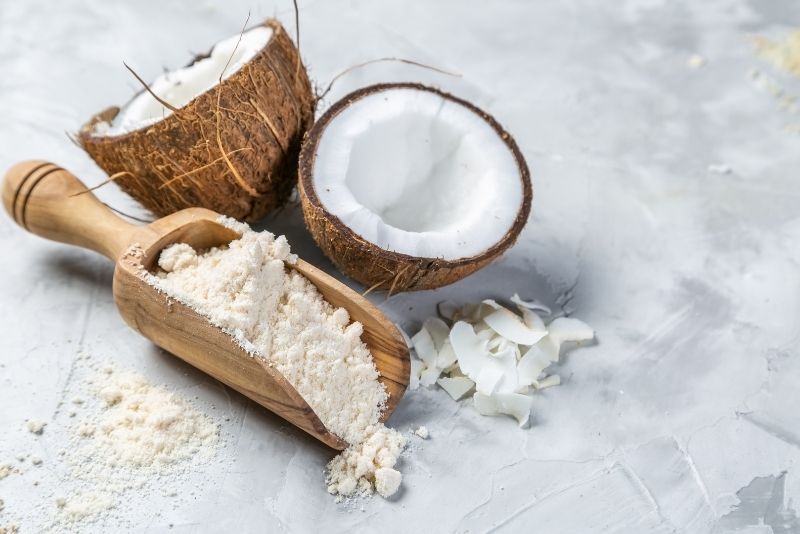
Coconut flour is a great substitute for potato flour because of its high fiber content. It absorbs moisture well, giving the same texture as regular flour, and doesn’t turn into gluten-free bread like cornstarch can.
Coconut flour can be used in baking, pancakes, biscuits etcetera, and also has a mild flavor that most people will enjoy. Provided it’s properly prepared, coconut flour provides a denser and more bread-like texture than potato flour does.
As an ingredient in many savory or sweet dishes – making it is versatile enough to be your go-to pantry staple!
11. Potato Starch
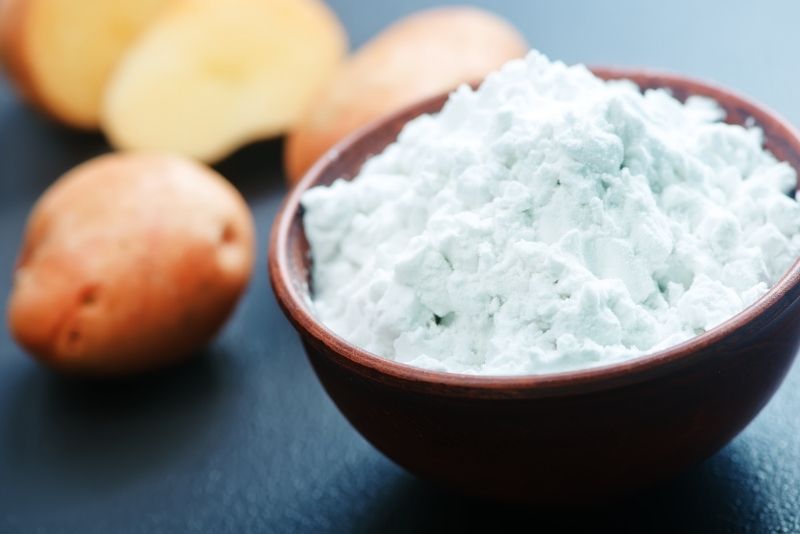
If gluten-free baking is one of your priorities, potato starch should definitely be on your list of substitute flour. Not only is it gluten-free, but potato starch also lends a great consistency to cakes and cookies – making them fluffy and rich in flavor.
Additionally, potato starch can be used as an excellent thickener, binder, and stabilizer for various recipes including pastries and pancakes. Its slightly sweet flavor makes it perfect for use in a recipe that requires sweeter ingredients such as frosting or syrup.
Finally, keep potatoes starch stored in an airtight container to avoid spoilage; usually, it lasts for up to two years without any problems!
12. Mochiko Flour
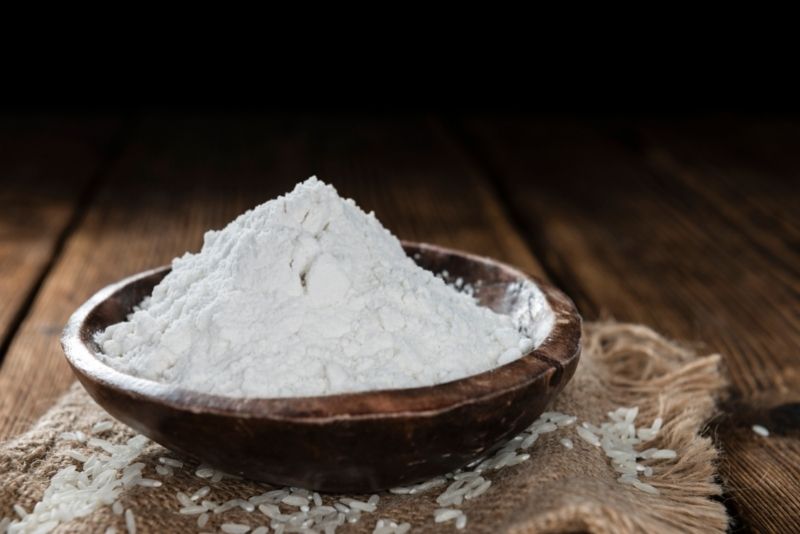
Mochiko flour is a gluten-free substitute for potato flour that can be used in baking and cooking. It has a slightly sweet taste with a nutty flavor that lends depth to recipes.
Additionally, it can be used as the main flour in gluten-free bread, cakes, pastries, and more – perfect for people on restrictive diets! Since Mochiko flour is made from a combination of sweet rice, it doesn’t contain any wheat gluten which makes it compatible with all types of flours – including wheat, rye, and barley.
Finally, mochiko flour can also be substituted for all-purpose flour when baking pancakes or waffles.
13. Sorghum Flour
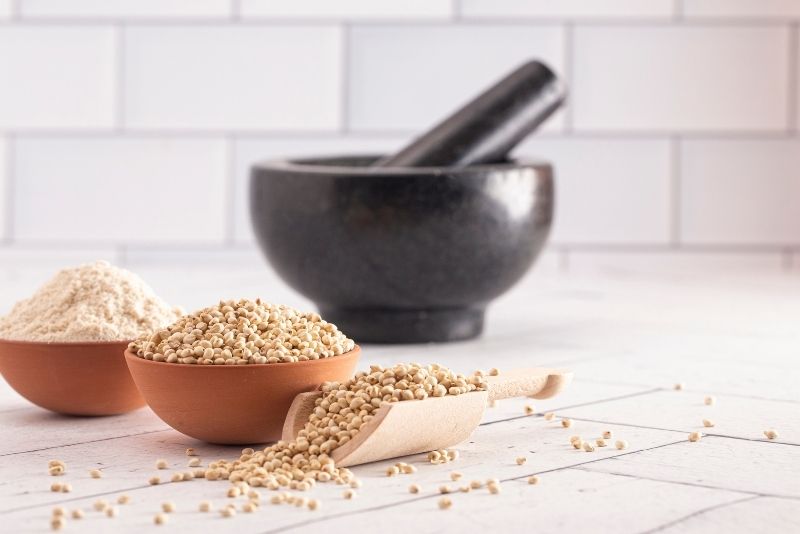
Sorghum flour is a great substitute for potato flour in baking recipes. It has a similarly textured and gives baked goods a delicious flavor profile. It can also be used as an ingredient in breading or batter mixes to give them a unique flavor profile.
Keep in mind that sorghum flour needs to be cooked before using it – just like with other flour. Some of the benefits of using sorghum flour are that it is gluten-free, has a low glycemic index, high in fiber and vitamins, and minerals- making it perfect for those on restricted diets or those looking for healthy alternatives to wheat products.
Sorghum flour is also easy to find and relatively inexpensive- so you won’t break the bank when trying out this amazing grain!
14. Cassava Flour
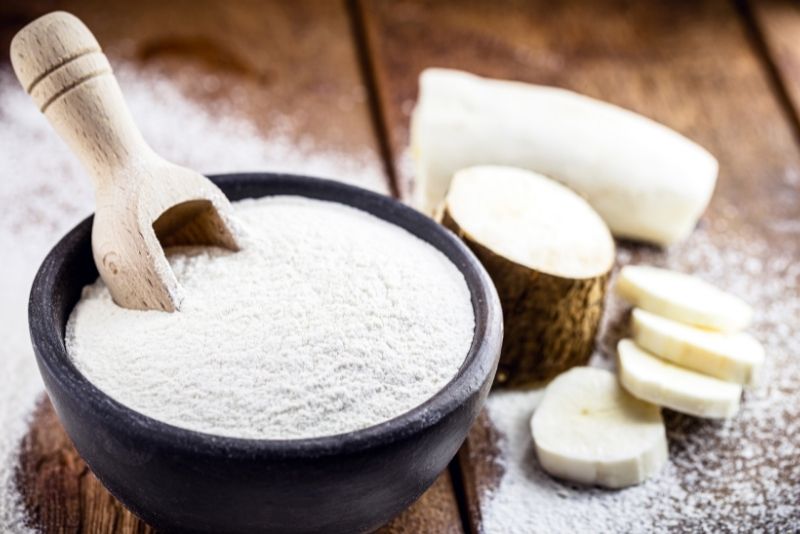
Cassava flour is a gluten-free, high-carbohydrate flour made from cassava root. It is similar to potatoes in terms of nutritional value and has a very low glycemic index – meaning it won’t spike blood sugar levels like other types of flour can.
Tastes just like regular flour and doesn’t need any adjustments when baking or cooking; it even works well as a thickener or for making sauces or dressings. Cassava flour is also great for gluten-free people, as it has almost the same nutritional value as wheat flour.
So whether you’re looking for an alternative to gluten-free baking powder or want to make your own sauces and dressings, cassava flour should definitely be on your list!
How Does Potato Flour Taste Like?
Potato flour tastes like potatoes, as one might expect, yet it’s not at all unpleasant. You would often add your potato flour to a meal, flour mixture, or cake mix, where other flavors would already overshadow it.
Frequently Asked Questions
1. Is potato flour the same as regular flour?
Potato flour is a type of flour made from mashed potatoes. It has a similar consistency, flavor, and rise to regular flour. Potato flour is gluten-free, so it doesn’t contain the elasticity or protein properties of regular wheat flour.
This means that potato flour is perfect for baking recipes that require gluten-free flour, like pancakes and doughnuts. Additionally, potato flour has a slightly different flavor than other types of flour so you may need to adjust your baking recipes if using it instead.
2. What does potato flour do in baking?
Potato flour makes yeast dough easier to handle and form when combined with all-purpose, bread, or whole wheat flour. It thickens soups and stews naturally, and a small amount added to gluten-free recipes makes the crumb softer.
3. Are cornstarch and potato flour the same?
Both starches can be utilized identically, making them interchangeable in the majority of recipes. There are a few exceptions, though. When substituting potato starch for cornstarch, it works best when added to dishes that won’t be cooked for a lengthy time.
4. Can I use rice flour instead of potato flour?
Yes, you can use rice flour in place of potato flour in most recipes. Some of the reasons why rice flour is a better option are: it’s gluten-free, it absorbs more moisture than potatoes, and it has more fiber and nutrients than regular white potatoes.
